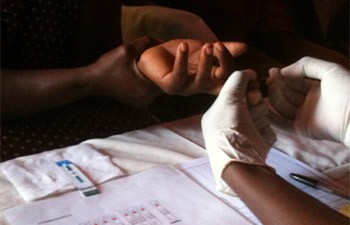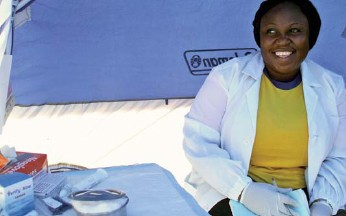- What We Do
- Agriculture and Food Security
- Democracy, Human Rights and Governance
- Economic Growth and Trade
- Education
- Environment and Global Climate Change
- Gender Equality and Women's Empowerment
- Global Health
- Humanitarian Assistance
- Transformation at USAID
- Water and Sanitation
- Working in Crises and Conflict
- U.S. Global Development Lab
Speeches Shim

HIV Testing and Counseling
At a Glance
There have been impressive gains in the uptake of HIV testing across the world, yet in sub-Saharan Africa, the region most affected by HIV, data on HIV testing uptake from 29 countries, conducted by the Demographic and Health Surveys project between 2003 and 2013, reveals that the majority of adults have never been tested for HIV.
As HIV treatment and prevention needs expand, these data highlight the need for countries to examine their programmatic efforts to find ways to strengthen and expand access to HIV testing and counseling (HTC) services that meet international standards. The 2012 World Health Organization (WHO) Strategic HTC Programme Framework [PDF, 540KB] describes a set of minimum standards: The 5 Cs of HTC: consent; confidentiality; counseling; connections to care, treatment and other services; and correct test results.
HTC is essential for reducing HIV-related morbidity, mortality and transmission. HTC links individuals and families to antiretroviral therapy (ART), care and support, and HIV prevention, such as the prevention of mother-to-child transmission of HIV and voluntary medical male circumcision. Once diagnosed, actively linking persons living with HIV (PLHIV) to services is critical for their own health, as well as to prevent HIV transmission to uninfected sex partner(s) and children. Yet many HIV-infected persons remain undiagnosed, and approximately half of individuals newly diagnosed with HIV in sub-Saharan Africa do not enroll in HIV clinical care after diagnosis. Achieving the U.S. President’s Emergency Plan for AIDS Relief (PEPFAR) Blueprint [PDF, 2.8MB] goals related to saving lives depends upon access to continuously improving, high quality HTC services and effective linkages to care and treatment services. Additionally, HTC provides a critical gateway to other core HIV prevention interventions, such as services for people who inject drugs and for PLHIV.
HTC can be provided in a wide range of settings, both inside and outside of health care facilities, and is either provider-initiated (recommended by a health care provider) or client-initiated (sought by individuals who feel they are at risk).
USAID’s Response

The U.S. Agency for International Development (USAID) is a key implementing partner of PEPFAR, providing leadership for the PEPFAR HIV Testing and Counseling Technical Working Group, expanding HTC services in countries across the globe and contributing to global policy and research agendas. In FY 2013, PEPFAR supported HIV testing and counseling for more than 57.7 million people around the world.
Since 2004, access to HIV services for persons diagnosed has dramatically increased – often identifying individuals earlier in their infection. HIV rapid testing, with same-day results, has allowed HTC to be expanded beyond health facilities and into communities and homes. Implementing a strategic mix of approaches to HTC, such as community-based and provider-initiated HTC based on a country’s context and make-up, has greatly expanded coverage, access and acceptance of testing.
USAID ensures that HTC and linkage to care efforts are undertaken in both clinical and community settings by health professionals, community health workers and trained volunteers. Settings include antenatal clinics, inpatient and outpatient departments, tuberculosis clinics, sexually transmitted infection and reproductive health clinics and drug treatment programs using the provider-initiated HTC approach. Mobile or outreach, home-based and stand-alone voluntary counseling and testing settings rely on a client-initiated HTC approach.
Through HTC, counselors and health care workers provide clients and patients with information, tools and access to prevention and care interventions, which allow protection from acquiring or transmitting the virus. HTC can enhance awareness within communities about HIV and AIDS since it allows people to converse, ask questions and learn.
Current Programmatic Highlights
Our work includes implementation of a range of HTC approaches, including community-based HTC, client-initiated HTC, provider-initiated HTC in clinical settings and support of HTC programs that reach specific key populations. These populations include pregnant mothers, couples (where partners are counseled, tested and disclose together), men, children, adolescents and key populations at higher risk of infection. Additional implementation science efforts help to inform expanded approaches to accelerating entry into HIV care and treatment after diagnosis. Illustrative examples of our work include:

- Innovative HTC Approaches to Reach Key Populations: [PDF: 2.3MB] In the first activity of its kind, the Integrated HIV/AIDS project in the Democratic Republic of Congo (ProVIC) partnered with a local NGO to assess the acceptability and feasibility of providing nighttime mobile voluntary HIV counseling and testing, or “moonlight” testing, to MSM, a group traditionally stigmatized and most at risk of HIV infection.
- Reaching New HIV Testers through Home-Based Testing and Counseling (HBTC) in Kenya: [PDF 1.6MB] This project focused on determining the acceptance and uptake of Home-Based Testing and Counseling and measuring the proportion of first-time testers and couples who were reached with HBTC services in rural Kirinyaga County, Kenya.
- Accelerating Entry into Care Following HIV Diagnosis: In collaboration with the Aurum Institute and the South African Department of Health, this study examined barriers and facilitators to entry into HIV care and how to increase the timely entry into care among people recently diagnosed with HIV.
- Combination Intervention Strategies for Linkage and Retention: This site-randomized study in Mozambique compares the effectiveness of a combina¬tion of interventions, versus the current standard of care, on link¬age and retention of newly diagnosed HIV patients.
- Community-based Family Planning-HTC integration in Uganda: [PDF, 596KB] A study that integrated HTC into family planning service delivery by Village Health Teams in Uganda seeking health system efficiency while meeting comprehensive reproductive and sexual health needs.
- Positive Connections: [PDF, 4.3MB] A guide that provides facilitators with background information about the needs of Adolescents Living with HIV tips for starting an adult-led support group, and 14 sessions to follow in a group setting. This guide is implemented in collaboration with FHI360 under the PTA project.
- HIV Self-testing Assessment in Namibia: [PDF, 1.0MB] A rapid assessment of the availability of HIV Rapid Testing Kits sold over the counter in private pharmacies in Windhoek, Namibia, with attention to the regulatory and policy environment.
- Linking Gender-based Violence (GBV) Counseling to HTC: [PDF, 1.5MB] This document provides a framework for integration of gender-related concerns within HIV testing and counseling services. This is described in PEPFAR's 2014 updated Gender Strategy.
Additional illustrative activities include:
- Training and support for HIV counselors and other staff
- Social marketing to promote HTC and enhance community acceptance
- Engagement of other donors and local host country governments to coordinate HTC efforts
- Development of HTC guidelines, policies and protocols adapted to the specific country and cultural contexts
- Evaluations of new HIV rapid testing kits and technologies
Additional Resources
USAID supported the development of the following fact sheets that illustrate the state-of-the-art evidence on key issues related to HTC:
- List of Approved HIV/AIDS Rapid Test Kits - 7/28/15 [PDF, 146KB]
- Provider-Initiated HIV Testing and Counseling: Rigorous Evidence – Usable Results [PDF, 1.3MB]
- Voluntary Counseling and Testing: Rigorous Evidence – Usable Results [PDF, 1.1MB]
USAID provides technical input into numerous WHO guidelines and references on HTC.
Peer-reviewed Publications
- HIV Self-Testing in Resource-Limited Settings: Regulatory and Policy Considerations
- Towards Universal Voluntary HIV Testing and Counselling: A Systematic Review and Meta-Analysis of Community-Based Approaches
- From caution to urgency: the evolution of HIV testing and counselling in Africa [PDF, 817KB]
- Foundation for the Future: Meeting the Psychosocial Needs of Children Living With HIV in South Africa and Uganda
- Universal voluntary HIV testing in antenatal care settings: a review of the contribution of provider-initiated testing & counselling

Comment
Make a general inquiry or suggest an improvement.